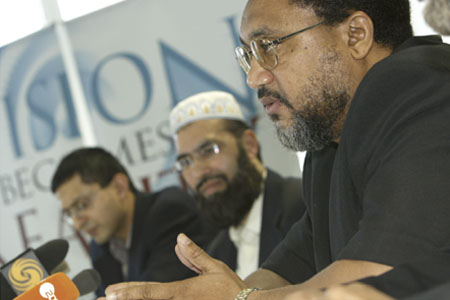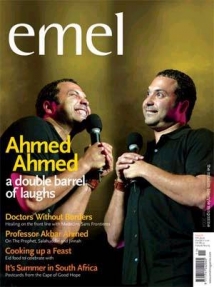
Mission to Baghdad
Issue 8 Nov / Dec 2004
First Published on November/December 2004
To access the issue page, click here
"As soon as you touch down in Baghdad you realise you're in a war zone. You see tanks moving around, soldiers, road blocks, people in armoured gear, armoured vehicles."
Daud Abdullah describes his unusual journey to Baghdad where he tried and failed to save the life of British hostage Ken Bigley.
The kidnap of Ken Bigley became a national tragedy, especially because his kidnappers are known to be people who are ruthless and have a good record of demonstrating this. Our mission was part of what I call a national effort to gain the release of Kenneth Bigley. We believe that issues like these, indeed the task and the responsibility of promoting goodwill and cooperation between people, should not be the responsibility of governments alone, but should extend to civil society bodies. Hence we undertook this initiative, fully supported by the Foreign and Commonwealth Office. In a sense we embarked upon a campaign to convey a message on behalf of the British people to the captors. We at the MCB are a body very much at the forefront of civil life in Britain. We play a prominent role in promoting cooperation, understanding and building bridges. Many people in the community look up to the MCB for leadership and to demonstrate a sense of responsibility. There is a verse in the Qur’an, which says, ‘Whoever saves the life of an innocent person from unjust killing is as if he has saved humanity.’ This is the spirit that motivated and drove our mission to Baghdad.
We travelled to Kuwait on Friday and to Baghdad later on Saturday on a military aircraft. The Foreign Office had undertaken to facilitate our journey and security in Baghdad, so we were met at Baghdad military airport and taken into the Green Zone. This is the international zone where international workers reside in Baghdad, it is a closed area which has been sealed off militarily and which also houses the embassies of the United Kingdom and the United States, as well as the various ministries of the Iraqi government. As soon as you touch down in Baghdad you realise you’re in a war zone. You see tanks moving around, soldiers, road blocks, people in armoured gear, armoured vehicles and so on. You yourself have to be wearing all this military stuff. It drives home to you the reality of war and how close you are to death. In the night we heard aircrafts flying over. The next day we learned that Madinat-Saad had been bombed. That was the last night we were there. There was a great deal of noise. On the last morning there was also bombing very close to where we were based.We didn’t see much of Iraq to begin with, but the feeling of what has happened is that this is a society that has suffered great loss. The country’s infrastructure has been destroyed, people have been driven into poverty and they are really at the ends trying to survive with foreigners on their soil.
The conviction I came away with is that this is not a project that will succeed. The occupation has been imposed upon the Iraqi people ever since the fall of Saddam Hussein, and it will not work. The evidence of this is in Baghdad itself because there are parts of Baghdad that are no-go areas for the coalition troops themselves. And so if there are parts of Baghdad that they cannot go, what would it be like in other parts of the country? The fact is there is tremendous resistance to the presence of foreign troops in Iraq.
The way the Americans, in particular, are dealing with the resistance indicates that the insurgency, the resistance, the war to liberate Iraq from foreign rule, all this will continue for some time.
We spoke to civilians and some were sympathetic to our mission. However they pointed out that the task of trying to help us would be complicated by the continued indiscriminate bombing of Iraqi cities and they wanted us to emphasise this message to the British authorities.
We met with a number of civil religious leaders, tribal leaders, political leaders; we met the President of Iraq for a very short period. We felt in going there we should, as a matter of courtesy, give him a call and convey greetings from the Muslim Council of Britain. We also met Dr Mohsin Abdul Hameed, Chairman of the Islamic Party of Iraq which is a member of the transitional government. The Islamic Party of Iraq has its origins in the Muslim Brotherhood and we felt that Dr Mohsin may be able to help us. He was very welcoming and organised for the media wing of the Islamic party to cover our visit so we were afforded some time on their radio station to issue an appeal to the Iraqi people and to those holding Ken Bigley hostage to show mercy and clemency and to release him.
We tried to get across the message that we are ordered in the Qur’an to be just and do good, and that Mr Bigley was a non-combatant and taken hostage from his home, we believe that there is no basis for his execution. I don’t believe his captors were setting out to distort Islam but I believe that their understanding, approach and methodology is questionable.
The objective of seeking an end to the occupation of one’s homeland is something any Muslim should aspire to, this is regarded as a noble act. However, the ends in Islam do not justify the means. One must pursue goals by noble means that are endorsed and recognised by Islam.
We tried to get our message out via the Iraqi media as much as we could. We circulated appeals in the largest broadsheets in Baghdad. We also carried with us a letter from Yusuf Islam; we hoped his high profile and his support for just causes would boost our efforts.
Soon after we came back from Iraq, into the week of the Labour Party Conference, we found the release of that video of Ken and that gave us hope, albeit short-lived. It confirmed that he was alive which was in itself a reason to be hopeful for his release. You should remember that before going to Baghdad no one really knew whether he was alive, but as a result of the efforts made during that week we knew that at that time he was and that probably is one of the achievements, I would say, of the trip.
On Thursday 8th October, Abu Dhabi TV received a video of Kenneth Bigley’s execution at the hand of his captives. emel wishes to send condolences to his family, friends, colleagues and associates. We pray for the wellbeing of anybody being held unlawfully, anywhere in the world.
words Sadiya Chowdhury
photo Rehan Jamil
Bookmark this |
|
Add to DIGG |
|
Add to del.icio.us |
|
Stumble this |
|
Share on Facebook |
|
Share this |
|
Send to a Friend |
|
Link to this |
|
Printer Friendly |
|
Print in plain text |
|


Comments
0 Comments